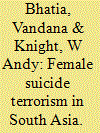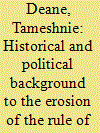| Srl | Item |
| 1 |
ID:
117902


|
|
|
|
|
| Publication |
2011.
|
| Summary/Abstract |
In this article we compare two conflicts in South Asia-civil war in Sri Lanka and the insurgency in Kashmir-to investigate the enabling conditions for female suicide terrorism in the former, and the lack thereof in the latter. We conclude that female suicide terrorism is a product of several inter-related factors that feed into each other: (i) tormented society, (ii) individual grievances, and (iii) a terrorist organisation with an effective indoctrination structure. Thus, rather than focusing on the individual motivations behind the female bombers, it is important to situate them in specific socio-political contexts.
|
|
|
|
|
|
|
|
|
|
|
|
|
|
|
|
| 2 |
ID:
148045


|
|
|
|
|
| Summary/Abstract |
reflection of deepening divides along political and ethnic lines. During this civil war the Sri Lankan Government and its security forces have been implicated in unlawful killings carried out in a pervasive manner against civilians, whilst at the same time specifically targeting ethnic Tamils, humanitarian workers and journalists. The human rights of all citizens suffered as a result and ultimately led to the weakening of the rule of law. With the end of the civil war, the Sri Lankan Government has made little progress in providing accountability for wartime abuses. Its absence of and reluctance to ensure justice is seen as a logical culmination of decades of impunity. The importance of acknowledging historical behaviour and taking accountability for past violations will be discussed. In an analysis for paving the way to a new democracy in Sri Lanka, the main outcomes of this article are calls for accountability arising out of the government’s actions during the war; an investigation into the present state of human rights, the rule of law and finally; an examination into the political solution going forward to ensure a process of reconciliation and peaceful co-existence.
|
|
|
|
|
|
|
|
|
|
|
|
|
|
|
|